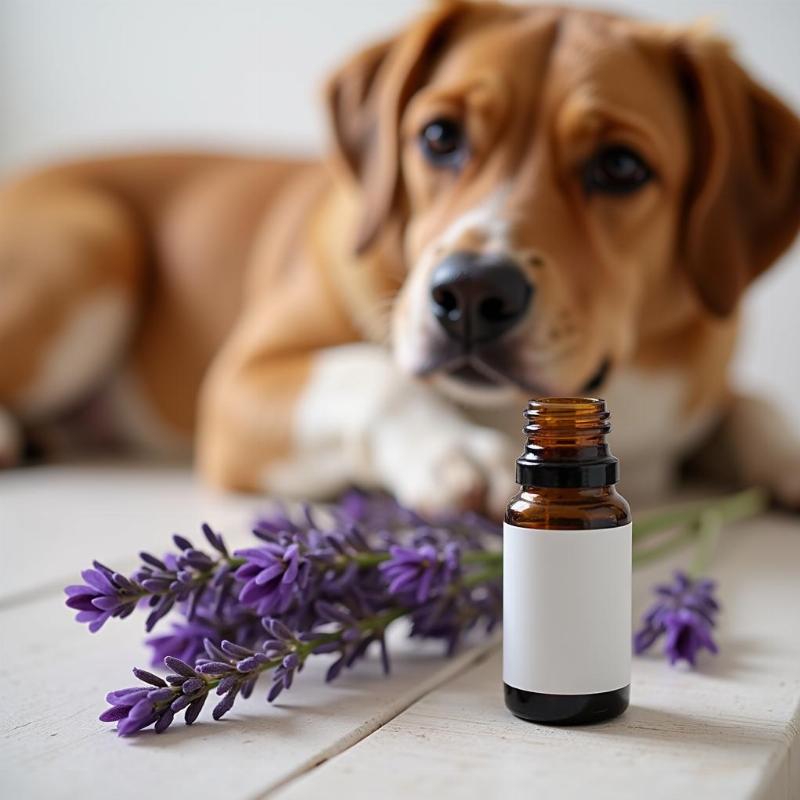Essential oils have gained popularity for various wellness purposes, and some pet owners are curious about their potential benefits for dogs with epilepsy. While anecdotal evidence exists, it’s crucial to approach this topic with caution and prioritize your dog’s safety. This article delves into the current understanding of essential oils for dogs with epilepsy, emphasizing the importance of veterinary guidance and responsible use.
While some pet owners believe essential oils like lavender and chamomile can have calming effects that may indirectly benefit dogs experiencing anxiety related to seizures, scientific evidence supporting their direct impact on epilepsy is limited. It’s essential to consult with your veterinarian before using any essential oils on your dog, especially if they have a pre-existing medical condition like epilepsy. Never replace prescribed medication with essential oils without your vet’s explicit approval. The safety and efficacy of essential oils for canine epilepsy are still under investigation, and improper use can pose risks.
Understanding Canine Epilepsy and Conventional Treatments
Canine epilepsy is a neurological disorder characterized by recurring seizures. Conventional treatments typically involve anti-epileptic medications prescribed by a veterinarian. These medications aim to reduce the frequency and severity of seizures, improving the dog’s quality of life.
Exploring the Potential Role of Essential Oils
Some essential oils are believed to possess calming and relaxing properties, which could potentially benefit dogs experiencing anxiety or stress, factors that might trigger seizures in some cases. Lavender and chamomile are often mentioned in this context. However, it’s crucial to understand that these are not proven treatments for epilepsy itself.
Safety Precautions and Veterinary Guidance
The use of essential oils in dogs requires careful consideration. Dogs have a more sensitive sense of smell than humans, and certain oils can be toxic to them. Always dilute essential oils appropriately and use them in well-ventilated areas. Never apply oils directly to a dog’s skin or allow them to ingest oils.
Potential Risks and Side Effects
Improper use of essential oils can lead to various side effects in dogs, including skin irritation, respiratory problems, and even liver or kidney damage. It’s vital to be aware of these risks and prioritize your dog’s safety.
Is Lavender Oil Safe for Dogs with Epilepsy?
While lavender oil is often touted for its calming properties, its safety and efficacy for dogs with epilepsy are not definitively established. Always consult your veterinarian before using lavender oil or any other essential oil on your dog, especially if they have epilepsy.
 Lavender Essential Oil and a Dog
Lavender Essential Oil and a Dog
Conclusion
While some pet owners explore essential oils for their dogs with epilepsy, it’s crucial to approach this topic with caution and prioritize veterinary guidance. Essential oils should not replace prescribed medications without your vet’s approval. Further research is needed to fully understand the potential benefits and risks of essential oils for canine epilepsy. Always prioritize your dog’s safety and well-being by consulting with a qualified veterinarian before incorporating any alternative therapies into their treatment plan.
FAQ
- Can essential oils cure epilepsy in dogs? No, there is no scientific evidence to support the claim that essential oils can cure epilepsy in dogs.
- What are the safest ways to use essential oils around dogs? Diffuse oils in well-ventilated areas and always dilute them appropriately. Never apply oils directly to a dog’s skin or allow them to ingest them.
- Which essential oils are considered potentially toxic to dogs? Several essential oils are toxic to dogs, including tea tree oil, pennyroyal oil, and wintergreen oil.
- What are the signs of essential oil toxicity in dogs? Signs of toxicity can include vomiting, diarrhea, lethargy, tremors, and difficulty breathing.
- Should I tell my vet if I’m using essential oils on my dog? Yes, always inform your veterinarian about any complementary therapies you are using on your dog, including essential oils.
- Are there any proven alternative therapies for canine epilepsy? While some alternative therapies are being explored, always discuss them with your veterinarian before incorporating them into your dog’s treatment plan.
- What should I do if my dog has a seizure? Remain calm, ensure the environment is safe, and contact your veterinarian immediately.
Beautdogs.us is your premier online resource for comprehensive dog care information, breed insights, and product recommendations. Whether you’re a new dog owner or a seasoned enthusiast, Beautdogs.us provides expert guidance on every aspect of canine companionship. We offer valuable resources and product recommendations to enhance your dog’s well-being. For expert advice and personalized support, contact us at [email protected] or +1 501-555-7529. Explore Beautdogs.us today to discover a world of valuable insights for nurturing a happy and healthy canine companion.